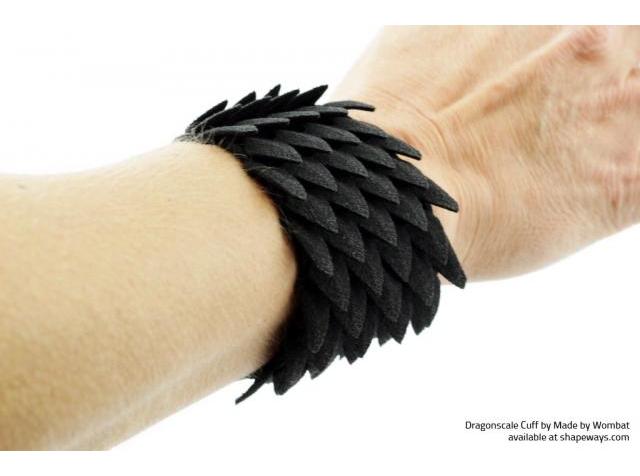Shapeways Elasto Plastic Bends to Your Will

Design created with elasto plastic. Courtesy of Shapeways.
Latest News
May 30, 2012
Plenty of shiny, new 3D printers come out all the time. They have increased build envelopes and improved resolutions and all that cool stuff. Don’t get me wrong. I like reporting on new systems as much as the next tech nerd, but all that new printer smell doesn’t do much without materials to run it.
Materials innovation seems to be lagging slightly behind the development of the printers they are meant to feed. I talked with several people at RAPID 2012 who lamented the general lack of quantified standards for materials, the secrecy around new material developments, and so on. It’s partially because of those conversations, and partially my compulsion to share interesting news, that makes me so interested in new materials.
I’ve done a number of short bits (usually in Rapid Ready Roundups) about the newest Morris Technologies materials and I’m slowly, but surely, working on a super-secret materials project for the site. I think covering new materials is just as important as covering new products. It might even be more important for those readers who use service bureaus to create objects, rather than investing in new 3D printers.
With that in mind, let’s have a look at the new material offered by Shapeways. Developed by Advanced Laser Materials, elasto plastic (or TPE 210-S, flexible nylon elastomer sintering material, if you prefer the more technical terminology) seems to offer something different for selective laser sintering machines. Lots of materials get dubbed with the word “flexible,” but this one actually seems to have earned it.
Rather than just having a slight elasticity to the material, elasto plastic will actually bend without requiring the sort of chainmail link look required by other materials. Shapeways suggests a thickness of no less than 1.5 mm and further hedges by suggesting that seriously complex objects might not be as flexible because the infiltrant used to strengthen the elasto plastic might not make it to hard-to-reach nooks and crannies.
All the same, a 3D printed material that acts very nearly like rubber is pretty amazing. How would you like to print out a spare tire or flexible tubing to spec? It even works as a functional eraser! Most of the uses the material has been put to so far are pretty basic (jewelry and toys), but it seems to me advances like elasto plastic have some potential for serious work as well.
The price for the new material is $2/cm3. It has a tensile modulus of 8 MPa/1,160 psi and an uninfiltrated elongation at break of 110%. A melting point of 178º C isn’t too shabby either. The stuff does have a slight tendency to flake, similar to other untreated elastic materials.
Below you’ll find a clip of the new material.
Source: Shapeways
Subscribe to our FREE magazine, FREE email newsletters or both!
Latest News
About the Author
John NewmanJohn Newman is a Digital Engineering contributor who focuses on 3D printing. Contact him via [email protected] and read his posts on Rapid Ready Technology.
Follow DE






